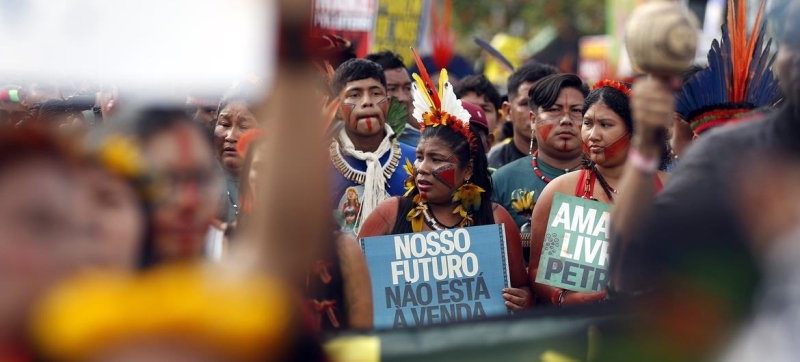- UN Security Council to Vote on Gaza Stabilisation Force |
- COP30 Enters Final Stretch with Urgent Calls for Action |
- Dhaka’s air turns ‘moderate’ Tuesday morning |
- Russian Navy ship arrives in Ctg for goodwill visit |
- New harvest, no festival: Lalmonirhat's ‘Nabanna’ spirit fades? |
COP30 Enters Final Stretch with Urgent Calls for Action

Global March of Indigenous Peoples - The Answer is Us, a side event at COP30.
The last week of COP30 has begun in Belém with a palpable sense of urgency. Ministers and senior officials are now stepping into the spotlight as negotiations move from technical wrangling to political decision-making. The stakes are high: charting a credible path to climate justice in a world running out of time.
UN climate chief Simon Stiell set the tone on Monday, saying,
“There is a deep awareness of what’s at stake, and the need to show climate cooperation standing firm in a fractured world.”
His warning was blunt: “There is no time to lose with delays and obstruction.”
For the next two days, ministers will lay out their positions in what is often the most charged phase of the summit. Mr Stiell urged delegations to address the hardest issues now – not in a last-minute scramble.
“There is no time to waste with tactical delays or stonewalling,” he said, adding, “The time for performative diplomacy has now passed.”
The President of the UN General Assembly echoed this urgency, reminding negotiators that despite “headwinds” and the many “ebbs and flows” of climate talks, they “do not have the luxury of wallowing when people are counting on them.”
Annalena Baerbock struck a note of optimism, pointing to unstoppable momentum in renewables and innovation. “The money exists but needs to be redirected,” she said.
She highlighted a stark figure: developing countries paid $1.4 trillion last year in external debt service – funds that could transform climate action if channelled into clean energy and resilience.
Speaking to reporters, Ms Baerbock said that on Sunday she had taken a 30-minute boat ride from Belém to visit Combu Island. There, on the edge of the Amazon rainforest, she met local Indigenous communities “who are showing how sustainable development, economic growth, and protection of the forest can go hand-in-hand.”
This, she said, “underlines again that climate action is not a ‘nice to have’. It’s not a charity. Climate action is in all of our security and economic interests.”
The 30th edition of the annual UN climate summit opened last Monday, on 10 November, and is set to conclude this coming Friday.
From Words to Action: Brazil Calls for a New Era
Brazil’s Vice-President Geraldo Alckmin declared that COP30 must mark a turning point. “The world must stop debating goals and start fulfilling them,” he said, adding that this means shifting from negotiation to implementation.
Mr Alckmin highlighted the Belém Commitment, an initiative to quadruple the use of sustainable fuels by 2035, already backed by 25 nations. He called for creativity in areas such as bioeconomy and decarbonisation, reaffirming Brazil’s pledge to “clean energy, innovation, and inclusion.”
Brazilian officials confirmed that two major decision packages are now on the table: one tied to frameworks mandated by previous COPs, and the other covering additional issues under negotiation, such as a gender action plan.
A draft of the first package is expected midweek, but COP30 President André Corrêa do Lago warned the schedule will be tight, with night sessions likely.
Beyond the Official Halls: People’s Summit Delivers Its Verdict
While ministers debated inside, the streets of Belém pulsed with energy. The People’s Summit, held from 12–16 November, drew more than 25,000 participants – the largest ever – and culminated in a climate justice march of 70,000 people, the biggest demonstration of its kind.
On Sunday, civil society handed over a package of proposals to Mr do Lago, along with COP30 CEO Ana Toni and key ministers including Marina Silva and Sônia Guajajara.
Maureen Santos, from the Summit’s political committee, said:
“I think this COP is serving as an example of democracy not only for the United Nations, but also for the world. And this is what multilateralism is: when parties truly engage beyond States, and you see greater visibility for those suffering the impacts of the crisis, who also bring forward the alternatives to confront it.”
Social movements are pressing hard on climate finance, warning of potential “ecological debts,” and calling for a broader vision of just transition – one that includes jobs, food sovereignty, and territorial rights, not just renewable energy.
Solidarity in Action: 300,000 Meals Served
The People’s Summit wasn’t just about speeches; it was about solidarity. Groups such as the Landless Workers Movement (MTST) organised a vast “solidarity kitchen,” drawing on experience from last year’s flood response in Rio Grande do Sul.
Over 300,000 free meals were served, featuring Amazonian staples like jambu, açaí, and pirarucu.
Rudi Rafael, who helped lead the operation, described the scale:
“We had 21 pots of 500 litres each, with a production line preparing meal boxes in just 26 seconds.”
For many, the kitchen symbolised hope, especially for those defending Indigenous lands, traditions, and cultures. It is a reminder that climate justice is as much about dignity and community as it is about policy.

